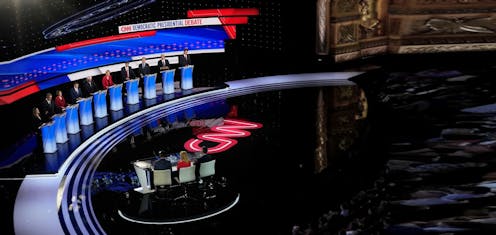the battle for the soul of the US Democrats that's taking place before our eyes
- Written by Richard Holden, Professor of Economics, UNSW

Over the past two days the 20 leading contenders for the role of the US Democratic Party’s 2020 presidential candidate have faced off in two debates.
The exchanges between them – sometimes sharp – revealed a stark divide on economic matters. In many ways, the party’s core economic narrative is up for grabs for the first time since Bill Clinton reshaped it in the early 1990s.
There were so many contenders that there had to be two rounds, each with 10 candidates, over two nights.
But it was debate 1 in Detroit that was perhaps the most revealing about the distinct economic philosophies.
Read more: Two dozen candidates, one big target: in a crowded Democratic field, who can beat Trump?
(Aside: debate 2 also had big names and serious contenders like Kamala Harris and Joe Biden, so it was also important, but it didn’t add much that would illustrate the economic divide.)
Debate 1 featured self-avowed “democratic socialist” Bernie Sanders, the man who was Hillary Clinton’s bete-noire in the 2016 primaries. In addition, Massachusetts Senator Elizabeth Warren, South Bend Indiana Mayor Pete Buttigieg, and Congressman Beto O'Rourke – all names even ordinary Americans might be familiar with.
Less well known, but critical, players in the opposing economic philosophies are Senator Amy Klobuchar and Congressman John Delaney.
You really don’t need to focus much on the other participants like the quirky but entertaining self-help guru Marianne Williamson, and the very likeable and reasonable Tim Ryan and John Hickenlooper.
The biggest battle line
The biggest distinction is between those candidates who believe in markets and those who basically don’t.
Sanders and Warren basically don’t. They want the US government to rail against corporations making lots of money. They think those companies make that money by corrupting politics. They want to aggressively tax the wealthy.
Delaney has a lot more faith in markets and free enterprise. He was an entrepreneur who took two companies public before the age of 40 and has a net worth of US$65 million.
Klobuchar doesn’t have the same background (she was a prosecutor before entering politics) but also doesn’t think government should do everything.
Buttigieg (or “Mayor Pete” as he is commonly known) was a McKinsey consultant (and Afghanistan War veteran) who is more technocratic, thinking that a good Excel spreadsheet piloted by smart folks can solve a lot of problems.
The two main issues that illustrate the big divide healthcare and taxation.
Medicare makes the difference stark
On healthcare there is no dispute that it should be universal, that every American should be covered.
The divide is between those who want there to be only government-provided health insurance, and those who want there to be a mix of government and privately-provided insurance.
A little background. “Medicare” in the US is a government-provided free plan for those 65-years and older. Other Americans get their health insurance either through their employer, don’t have health insurance, or since the advent of “Obamacare” (the Affordable Care Act) buy it themselves with a subsidy.
Read more: What the US could learn from Thailand about health care coverage
Sanders and Warren want what they call “Medicare for all”. By that they mean a single-payer system with no private insurance, everyone on Medicare.
Delaney, Klobuchar and others (especially Joe Biden from debate 2) think that’s nuts. That’s because it implies that the millions of Americans who have and value private insurance would lose it, either because bit was made illegal or because Medicare would price it out of the market.
They say they want a mere public “option”: if you like your insurance you can use it instead of Medicare, otherwise otherwise you use Medicare.
That’s a pretty stark distinction: between banning private commerce and not.
Over tax, the differences are just as stark
On taxation, again there is some agreement. All the candidates agree that wealthy Americans should pay more. What’s in dispute is how, and how much.
Warren wants a wealth tax that would take 2% of people’s wealth (not income) in excess of US$50 million (and take 3% of wealth in excess of US$1 billion).
The idea has been heavily criticised by luminaries such as former Treasury Secretary Larry Summers who say it won’t raise much money and will dampen incentive. They are pushing for laws which will close loopholes and tax shelters instead.
Read more: So you want to tax the rich – here's which candidate's plan makes the most sense
The idea has also been sharply opposed in the debate by John Delaney, who wants instead to increase the rate of capital gains tax (which, as in Australia, is lower than the income tax rate) and reverse Donald Trump’s tax cuts.
Here again, the contrast is between candidates trying to get more money from the wealthy while preserving incentives and candidates who see significant wealth as essentially immoral.
For years to come, the winner will take all
In essence the 2020 candidates are arguing about whether the third-way, market-oriented approach that Bill Clinton brought to the Democratic Party will endure, or be replaced with democratic socialism that “soaks the rich” and views private enterprise with scepticism.
At this stage there’s no telling which side will prevail. The result will have profound consequences for Americans for years to come.
Authors: Richard Holden, Professor of Economics, UNSW



















